Issue 33, February 2014
Methane International
The Global Methane Initiative Update
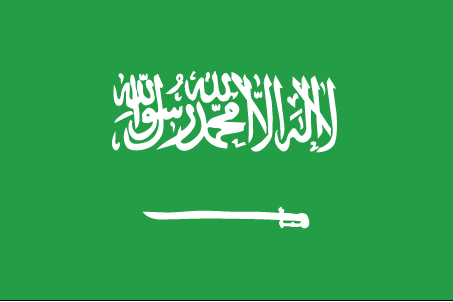
The flag of the Kingdom of Saudi Arabia.
The Steering Committee has officially approved the Kingdom of Saudi Arabia’s application to become a member of GMI, bringing total participation in GMI to 42 countries and the European Commission. As the world’s second-largest producer of petroleum, Saudi Arabia will appoint members to the Oil and Gas Subcommittee to share their extensive experience with flare management and gas recovery. The country will pursue opportunities in methane capture and reuse projects, including flare management, fugitive emissions control from pipelines and tanks, and gas recovery and utilization.
Australia Funds Coal Mine Methane Mitigation Projects
Australia produced an estimated 526.6 million tons of black coal in 2012–2013, along with 29 million tons of GHG emissions.
The Australian government has developed a plan to tackle greenhouse gas (GHG) emissions while improving safety and economic viability in the coal mining sector through the Coal Mining Abatement Technology Support Package (CMATSP) (PDF). A total of $39 million will be spent in the first round of CMATSP funding over five years on technologies that demonstrate how to safely reduce fugitive methane emissions from coal mines (e.g., ventilation air methane capture methods). As part of the funding agreement, recipients are asked to share their experiences and develop best practices for GMI.
Included in the first round of funding is Centennial Coal Company Limited’s Coal Mine Methane (CMM) project (PDF), which was featured at GMI’s Methane Expo 2013 in Vancouver, Canada. The project, which is currently under development, connects a regenerative thermal oxidizer (RTO) directly to a mine ventilation fan to capture fan flow. When operational, it will reduce methane emissions from coal mines by at least 98 percent―the equivalent of approximately 360,500 metric tons of carbon dioxide equivalent (MTCO2e) annually.
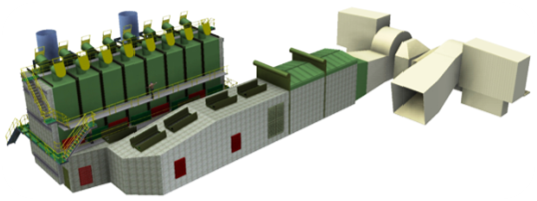
Schematic depicting Centennial Coal Company Limited's RTO project.
GMI’s tri-sector subcommittee meeting for the Agriculture, Municipal Solid Waste, and Municipal Wastewater sectors has been confirmed for 12-13 March 2014 in Florianópolis, Brazil. The meeting, hosted by Fundação do Meio Ambiente (FATMA), will run alongside a methane mitigation and abatement best practices workshop and will cover cross-cutting issues like project financing options and nationally appropriate mitigation actions (NAMAs). Additional Subcommittee business will be conducted on 14 March. For more information, view the event details, including the agenda, hotel information, and registration instructions, on the GMI website.
Subcommittees have been charged with developing action plans to provide data and information for an overarching GMI Partner Action Plan. The ASG finalized a guidance document, titled Elements for Sector Specific Action Plans (PDF), to assist the development of these strategy documents.
AgricultureThe Agriculture Subcommittee held an Internet-based meeting on 24 September 2013. The Subcommittee Co-chairs provided a summary of the finalized version of Successful Applications of Anaerobic Digestion from Across the World (PDF). Delegates discussed their next major project, now in its beginning stages, to develop a report examining the policies and financial incentives that have been implemented around the world to promote anaerobic digestion. They also discussed potential agenda topics for the tri-sector subcommittee meeting in March. Meeting materials, including the agenda, minutes, and presentation, are posted on the GMI website.
Coal
GMI Advocate Receives Award for Coalbed Methane Review
Mr. B.N. Prasad received the Republic of India’s Rajya Bhasha Award for his work
on a review of coalbed methane—the first of its kind written in Hindi. The book
was coauthored by Mr. A.K. Singh (former Co-Chair of the Coal Subcommittee) and
Mr. A.V. Sahay (Chief Geologist at the Clearinghouse).
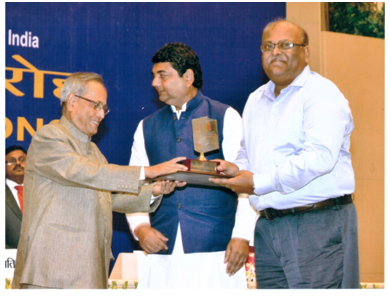 Mr. Prasad receives the Rajya Bhasa Award from the President of India.
Mr. Prasad receives the Rajya Bhasa Award from the President of India.
The Coal Subcommittee held its 18th session on 19–20 November 2013 in conjunction with the United Nations Economic Commission for Europe (UNECE) Ad Hoc Group of Experts on Coal Mine Methane. The meeting featured an in-depth roundtable discussion on strategies for maintaining existing CMM projects and developing new projects in this difficult carbon market, including an overview of successes and lessons learned during the post-2012 period. The Subcommittee also approved an update of the policy white paper on Flaring of Coal Mine Methane (PDF), which contains an updated selection of active CMM flaring projects in GMI Partner Countries. Delegates from Australia, Colombia, India, Mongolia, Poland, Russia, Turkey, Ukraine, and the United States provided updates on recent projects and energy policies affecting new CMM project development. All presentations from the meeting are available on the GMI website.
Municipal Solid Waste
Working with the Ministry of Housing and Urban-Rural Development (MOHURD) and the China Association of Urban Environmental Sanitation (CAUES)―both China GMI Partner Country contacts―the Municipal Solid Waste (MSW) Subcommittee has completed a Chinese translation of GMI’s International Best Practices Guide for LFG Energy Projects. The translated guide will be a useful resource for Chinese MSW professionals.
Earlier this year, GMI released the Resource Packet for Industrial Use of Landfill Gas (PDF). This packet provides an overview of the benefits of using landfill gas (LFG) as a renewable fuel in direct-use applications (e.g., fuel for boilers, heaters, kilns) and includes tools to assist in a preliminary evaluation of direct-use LFG projects.
The Subcommittee held an Internet-based meeting on 3 December 2013. Attendees received updates in waste-sector NAMA development; a new initiative for the MSW Subcommittee to research and catalog information on MSW anaerobic digestion that will be rolled out in 2014; and plans for the tri-sector subcommittee meeting in March and all-Partnership meeting later in 2014. The agenda and presentation topic areas are now available on the GMI website.
Municipal WastewaterThe Municipal Wastewater Subcommittee held an Internet-based meeting on 30 October 2013. The ASG presented on successful outcomes from Methane Expo 2013, and provided guidance on developing country-specific action plans. Participants also began to plan for the next meeting in March. Anticipated wastewater-specific topics include project case studies and biogas modeling and measurement, along with cross-sector sessions on project financing. Materials from the October meeting, including the presentation, recording, and minutes are now available on the GMI website.
GMI would like to recognize the contributions of Mr. A.B. Chakraborty. A long-standing
voice and strong leader on GMI’s Oil and Gas Subcommittee, Mr. Chakraborty will
be retiring from his post at India’s Oil and Natural Gas Corporation this year.
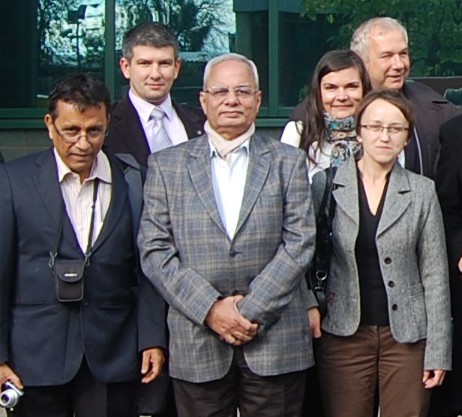
A.B. Chakraborty (center) with other attendees touring Gaz Systems in Poland
The Oil and Gas Subcommittee held an Internet-based meeting on 10 December 2013 where participants learned about the Climate and Clean Air Coalition to Reduce Short-Lived Climate Pollutants (CCAC) Oil & Gas Initiative. Working extensively with industry and complementary initiatives, the framework for CCAC’s O&G Methane Partnership (PDF) is now final. CCAC is seeking participation commitments from their founding partners. Also during the meeting, participants learned about member experiences developing NAMAs. Specifically, Canada has begun formal collaboration with Colombia and Mexico to support the development of oil and gas NAMAs covering key upstream, midstream and downstream facilities. So far, the collaboration has spanned baseline activity determination, quantification of emission reduction opportunities and business case development of significant “Mitigation Action” opportunities.
Next steps for the subcommittee include developing implementation plans, extrapolating facility results to draft sector NAMAs, and registering NAMAs with the United Nations Framework Convention on Climate Change (UNFCCC). All the meeting presenters recognized ongoing opportunities for collaboration to advance NAMA development with GMI and CCAC. The next in-person Subcommittee meeting will be co-located with the rescheduled Natural Gas STAR Implementation Workshop, which will take place on 12–14 May 2014 in San Antonio, Texas, United States.
GMI OutreachAsia
China, September 2013: China MSW Subcommittee delegate MOHURD and GMI collaborated with the International Solid Waste Association (ISWA) and the China Association of Urban Environmental Sanitation (CAUES) to host a workshop on LFG best practices during the ISWA International Conference on Solid Waste Management and Recycling in Wuhan, China. Seventy participants attended the workshop to learn about best practices for the installation, operation and maintenance of LFG recovery systems and developing LFG energy projects. The agenda and presentations are now available on the GMI website (Chinese and English).
Indonesia and Thailand, September 2013: U.S. EPA worked with new Natural Gas STAR International Partners VICO Indonesia and PTT to identify and measure fugitive and vented methane emissions at their oil and natural gas production and distribution facilities. These initial collaborative field studies increase Partner companies’ awareness of practical opportunities to minimize methane emissions, thereby increasing operational efficiency and site safety. Both companies are now planning to form their own internal teams to continue the directed inspection and maintenance practices.
China, October 2013: GMI coal sector staff presented on GMI and the worldwide outlook for CMM recovery and use projects, with a special focus on China, at the 13th International Symposium on CBM/CMM in China hosted by China Coal Information Institute, in Beijing. This international symposium has become a platform to promote the development of the CBM/CMM industry through strengthening technical and economic cooperation in CBM/CMM recovery and utilization in China and abroad. The two-day symposium gave participants an opportunity to promote potential collaboration and showcase the latest theoretical and technological advances on CBM/CMM and ventilation air methane recovery and utilization.
Middle East
Kuwait, Qatar, the Sultanate of Oman, and the Kingdom of Saudi Arabia, September 2013: GMI oil and gas sector representatives met with government officials and private-sector industry representatives to discuss oil and gas GHG emissions reduction opportunities and technologies available to Middle Eastern countries.
- In Kuwait, representatives conducted a site visit to various Kuwait Oil Corporation (KOC) facilities to prepare for a study examining methane emissions from KOC operations and participated in a technical workshop hosted by KOC.
- In Qatar, GMI oil and gas sector staff met with Qatar Gas’s GHG Management Specialist and conducted a workshop attended by 10 Qatar Gas employees on methane emissions opportunities and technologies.
- In Oman, GMI briefed the Omani Ministry of Foreign Affairs on the mission of GMI and discussed how reducing emissions from the oil and gas sector complements Oman’s climate change strategy.
- In Saudi Arabia, representatives held a technical conference with Saudi Aramco staff and discussed coordinating a study on possible sources of methane emissions in their operations. These meetings led Saudi Arabia to submit an application to become the newest GMI Partner Country.
Latin America
Mexico, September 2013: Government, private, and academic stakeholders, including the Secretariat of Environment and Natural Resources (SEMARNAT) and the National Water Commission (CONAGUA) met with GMI sector representatives to discuss ongoing technical assistance in the MSW and wastewater sectors in Mexico. A GMI representative presented at the National Autonomous University of Mexico’s conference on municipal wastewater treatment and climate change about the efforts of GMI to promote mitigation of methane in the sector.
Brazil, September 2013: GMI technical contractor SCS Engineers provided support for a CCAC-hosted leachate management training workshop that addressed how to minimize leachate generation, remove, and treat or dispose of leachate in an environmentally responsible manner. The training, hosted in cooperation with COMLURB and C40 Cities, was attended by over 130 people, including landfill operators, developers, and representatives from state and municipal environmental agencies. Materials from the training, including the agenda and presentations (in Portuguese), are posted to the CCAC MSW Knowledge Platform.
Europe
The Nordic Biogas Conference will be held in Reykjavík, Iceland, on 27-29 August 2014. The deadline to submit an abstract for the conference is 28 February 2014.
Ukraine, July 2013: Ukraine, July 2013: GMI staff, along with technical contractor Advanced Resources International (ARI) traveled to Ukraine to collect data for the recently completed CMM pre-feasibility study (PDF) at the Komsomolets Donbassa Mine, near Donetsk, Ukraine. The mine is owned by DTEK Holdings, one of the largest producers of thermal coal in Ukraine. The study included a preliminary evaluation of the site, surveyed plans for future expansion of the mine and discussed the feasibility of degassing the future expansion of mine workings through use of vertical pre-drainage wells and surface gob vent boreholes. DTEK is interested in utilizing the CMM for onsite power generation. In addition, GMI staff and ARI met with the Donetsk Regional State Administration and Ukruglerestrukturizatsia, the coal restructuring company that controls closed mines in the Donetsk Region, to discuss policies and practices for producing and using abandoned mine methane. For more information on CMM efforts in Ukraine, see Artur Ghazaryan’s Power and Heat Cogeneration to Utilize Coal Mine Methane—Ukrainian Experience (PDF) from the 2013 Methane Expo and State Policy of Ukraine in Capturing and Using Coal Mine Methane (PDF) by Igor Yaschenko, delivered at the 18th Session of the GMI Coal Subcommittee in Geneva, Switzerland on 19-20 November 2013.
Poland, September 2013: GMI representatives met with the Ministry of Economy, Ministry of Environment, LNG Silesia, and the Central Mining Institute (CMI), to discuss CMM activities. Poland’s coal companies are all state-owned, and as one of the largest coal producers in Europe, Poland has significant potential for CMM project development and collaboration with GMI. While in Katowice, CMI discussed the findings of a recent GMI grant to study degasification in Pawlowice coal field. In addition, GMI staff visited two mine sites with CMM projects: Zory abandoned mine cogeneration project and the JSW Krupinski mine CMM-to-LNG project. In 2014, GMI experts to award a grant to conduct a new pre-feasibility study in Poland to assess opportunities for CMM capture and use.
Turkey, September 2013: GMI technical contractors Ruby Canyon Engineering and Harworth Energy Limited–East met with management of the Turkish Hard Coal Industries to discuss initiation of a GMI CMM pre-feasibility study at their underground coal mine in the Zonguldak coal region of northwestern Turkey. The study will assess the feasibility of methane capture and utilization as part of an effort to control explosive methane outbursts, which have historically caused safety issues at the mine and are expected to increase as coal production moves deeper into the mine.
Ukraine, December 2013: In conjunction with GMI, the Verkhovna Rada (Ukrainian Parliament) Committee on Fuel and Energy Complex, Nuclear Policy and Nuclear Safety hosted a CMM roundtable in Ukraine featuring panel discussions on the implementation of CMM legislation in Ukraine, legal definitions of CMM-based energy, and policy options for supporting projects. Representatives from the Ministry of Energy and Coal Industry joined participants from coal mining companies, project developers and other key stakeholders in this event, which featured presentations from GMI coal sector staff and Project Network member Ruby Canyon Engineering.
News from the Climate and Clean Air CoalitionThe Climate and Clean Air Coalition to Reduce Short-Lived Climate Pollutants (CCAC) is a United Nations Environment Programme (UNEP) initiative to address reductions of pollutants that are short-lived in the atmosphere (such has methane, black carbon, and hydrofluorocarbons) and are responsible for a substantial fraction of current global warming. CCAC continues to move forward on its efforts to reduce short-lived climate pollutants (SLCPs) with a number of new developments. Representatives of the CCAC partner organizations adopted 10 initiatives (PDF) at their meeting on 3 September 2013 in Norway. They include:
- Working with 10 major cities to complete work plans on mitigating SLCPs from the MSW sector, and implementation of those plans. CCAC has begun to plan for the expansion of its MSW work, which will eventually encompass an additional 10 to 15 cities.
- Supporting actions to reduce methane emissions from agriculture processes, particularly related to livestock and paddy rice production.
- Supporting additional countries in developing national action plans to reduce SLCPs. In 2013, CCAC focused capacity building efforts on Mexico, Ghana, Colombia, and Bangladesh.
CCAC is also working to catalyze significant global investment in SLCP reduction. The World Bank, a CCAC partner, released a report titled Integration of Short-Lived Climate Pollutants in World Bank Activities, which describes how the Bank is integrating SLCP mitigation into development projects.
The ISWA 2014 Solid Waste World Congress will be held in Sao Paulo, Brazil, on 8–11 September 2014. With the theme “(Re)Discovering a New World—Sustainable Solutions for a Healthy Future,” the Congress aims to highlight the perspectives and trends for future waste management. The deadline to submit an abstract for the congress is 28 February 2014.
The CCAC Secretariat and the Lead Partners of the MSW Initiative launched the CCAC MSW Knowledge Platform on 7 October 2013 at the ISWA World Congress. The platform is designed as a tool to promote, share, and exchange information and provide outreach resources to support cities and governments to reduce SLCPs. ISWA and UNEP also conducted a GHG and SLCP Emission Quantification Workshop at the Congress to highlight current methodologies and gather input for guidelines on the different approaches to evaluating GHG and SLCP emissions and how they can be applied with a focus at the city level. View the presentation (PDF) from the workshop.
Recent Developments and Resources
ICLEI Prepares Bidding Guide for LFG Energy Projects in Mexico
Following its analysis of the current MSW situation in Mexico’s southeast region,
GMI Partner Country representative
International Council on Local Environmental Initiatives (ICLEI) has prepared
a bidding guide for LFG energy project development in Mexico. The document―entitled
Bidding Guide for Biogas Utilization in Municipal Landfills
(PDF, Spanish)―is designed to assist municipal governments in carrying out a transparent
and efficient public bidding process for the development of LFG projects.
Work Begins for LFG Capture Project in Cuenca, Ecuador
The Waste Management Company of Cuenca (EMAC) hired BGP Engineers to begin construction
on an
LFG capture and utilization project at Pichacay Landfill in Cuenca, Ecuador.
The two megawatt project will be the first of its kind in Ecuador. GMI has supported
the project from its early stages by producing a pre-feasibility study for LFG capture
and utilization at the site and providing LFG training for municipal officials and
landfill personnel (e.g., modeling LFG, types of technologies, project development
considerations).
GMI Supports Development of New Methane Production Technology
Researchers at the University of Texas at Arlington are in the final stages of development
for a sensor technology that can boost methane production in enhanced
leachate recirculation (ELR) landfills. The researchers hope the pilot project,
supported by a GMI grant, will result in the creation of a secondary source of energy
in Ghana by increasing methane gas production in the country’s ELR operations. The
moisture sensor enables landfill managers to monitor the efficiency and progress
of ELR operation and recognize when to recirculate.
International Energy Agency Member Countries Issue Joint Statement on Energy
Sector and Climate Change
The 28 Member Countries of the International Energy Agency (IEA) came together at
the biennial Ministerial meeting in November 2013 to issue a joint statement (PDF) acknowledging the significant role
that the energy sector can play in limiting climate change. The statement was released
as a follow-up to the World Energy Outlook Special Report
Redrawing the Energy-Climate Map (PDF) released in June, which identified
minimizing methane emissions from oil and gas production as a measure that could
halt the growth in energy-related emissions without harming economic growth. In
the statement, IEA members encouraged countries to take the policy measures proposed
in the report into account as they prepare to negotiate a new agreement under the
UNFCCC.
India Hosts International Workshop on Development of Coal Based Non-Conventional Energy Resources
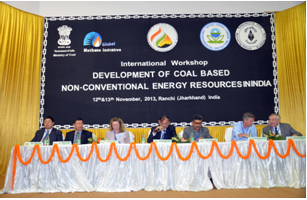
Presenters at the workshop’s plenary session.
India’s Central Mine Planning & Design Institute (CMPDI), held an international workshop on “Development of Coal Based Non-Conventional Energy Resources in India” from 12-13 November, 2013. Taking place next to the CMM/CBM Clearinghouse in Ranchi, the workshop’s aim was to disseminate information on the development of CBM/CMM resources in India, and to showcase development opportunities in CMM/CBM/VAM projects.
The workshop was well-attended by almost 150 top governmental officials, international technical experts, CBM project operators, academics and research organizations. Topics of discussion related to CMM/CBM/VAM included policy issues, emerging technologies, research trends, opportunities and challenges. U.S. EPA CMOP’s Dr. Jayne Somers, along with Jon Kelafant (ARI), represented GMI’s coal sector at the workshop. They gave presentations at the plenary session on GMI’s latest activities, especially in relation to India, plus new developments in methane drainage. Visit the CMM/CBM Clearinghouse website to view presentations and recommendations resulting from the workshop.
In this edition:
- GMI's Newest Member—the Kingdom of Saudi Arabia!
- Australia Funds Coal Mine Methane Mitigation Projects
- Subcommittee Updates
- GMI Outreach
- News from the Climate and Clean Air Coalition
- Recent Developments and Resources
ASG Corner
GMI is celebrating its landmark 10-year anniversary! We are planning several notable events to commemorate this milestone, including:
- The combined Agriculture, Municipal Solid Waste, and Municipal Wastewater tri-sector subcommittee meeting and technical and policy sessions, which will be held in Florianópolis, Brazil, in March 2014 (visit the event page and see below for more details).
- In May 2014, the Oil and Gas Subcommittee meeting to be held in conjunction with Natural Gas STAR Implementation Workshop, which will take place in San Antonio, Texas, United States.
We are also producing a commemorative publication and video to provide an overview of GMI, feature example projects from our five sectors, and showcase your successes in reducing methane emissions over the last decade.
Thank you to GMI Partners and Project Network members for contributing to the success of GMI and for your accomplishments over the last decade. Stay tuned for more announcements as we plan the upcoming anniversary year.
Sincerely,

Henry Ferland
Co-Director, ASG

Monica Shimamura
Co-Director, ASG